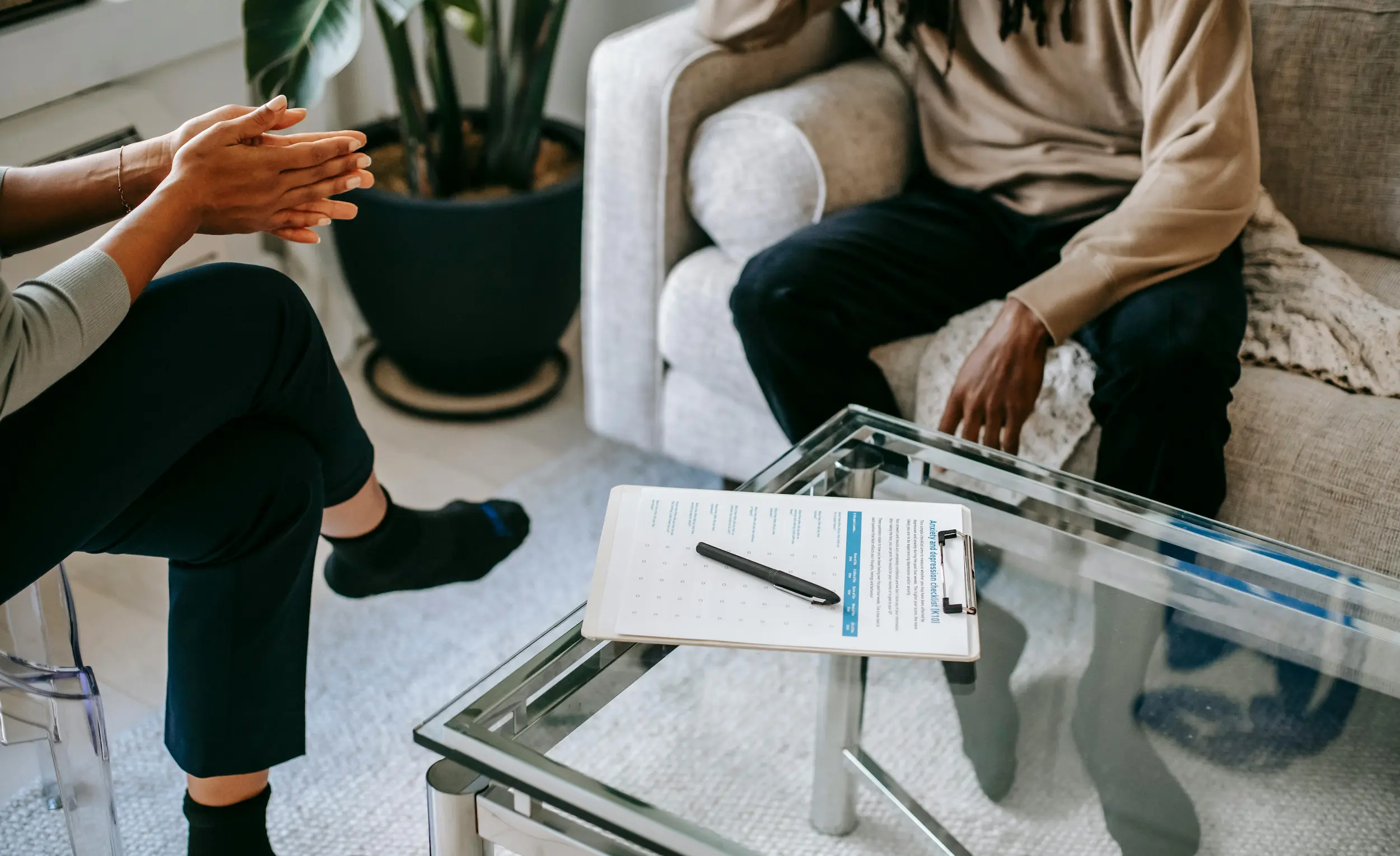
Summary Of Who Qualifies:
Oregon's psilocybin therapy (also referred to as 'mushroom therapy') program is designed to be broadly accessible while prioritizing safety through general screening (which should not be viewed as a medical service). Unlike clinical trials that often have restrictive criteria, Oregon's program welcomes adults seeking therapeutic benefit for a wide range of intentions - from addressing specific mental health challenges to personal growth and spiritual exploration. No medical diagnosis, psychiatric referral, or doctor's prescription is required.
However, certain medical, mental health, and substance use factors require careful consideration to ensure safe and effective service. Some conditions may be absolute contraindications, while others simply require modified approaches such as lower doses or additional preparation time.
Legal Disqualifications - When We Cannot Provide Services
Oregon regulations and safety protocols establish several absolute contraindications where psilocybin therapy cannot be provided at any dose level:
Age Requirements
Must be 21 years or older. This is a strict legal requirement under Oregon law with no exceptions. The program is not available to minors or young adults under 21, regardless of parental consent or medical need.
Active Safety Concerns
Current thoughts of harming yourself or someone else. Active suicidal or homicidal ideation represents an immediate safety risk that requires crisis intervention and stabilization before considering psilocybin therapy. Psilocybin can intensify emotions and thoughts, making it inappropriate during acute mental health crises.
Personal History of Psychosis
Any personal history of psychotic symptoms that were not induced artificially (eg by medication in an otherwise non-psychotic individual). This includes schizophrenia, schizoaffective disorder, brief psychotic episodes, or other conditions involving hallucinations, delusions, or significant breaks from reality. Psilocybin can potentially trigger or worsen psychotic symptoms, making it contraindicated for anyone with this history.
Lithium Medication
Taking lithium within the past 30 days. Lithium can amplify psilocybin's effects and some research has shown the two substances together can increase risk of seizure. Out of an abundance of caution, Oregon does not allow clients to hold administration sessions consuming any amount of psilocybin within 30 days of having consumed any form or amount of lithium. Clients should discuss titration with their medical provider, as facilitators do not provide medical advice.
Important Note: These are absolute contraindications. If any of these factors apply to your situation, licensed facilitators cannot provide psilocybin services under Oregon regulations and safety protocols.
Physical Health Considerations For Psilocybin Therapy
Certain physical health conditions don't necessarily disqualify clients from receiving psilocybin therapy but may require a modified approach, typically starting with much smaller doses or delayed timing.
Cardiovascular Conditions
Severe heart disease, uncontrolled high blood pressure, or recent cardiac events require extra caution. Psilocybin can temporarily increase heart rate and blood pressure similar to moderate exercise for 60-90 minutes. Clients with significant cardiovascular issues may be better candidates for microdosing protocols and should proceed with larger doses with caution. They may wish to get their medical provider's approval to proceed.
Kidney and Liver Disease
Severe kidney or liver impairment affects how the body processes psilocybin. Reduced organ function may require dose modifications and closer monitoring. Microdosing allows for gentler introduction while assessing individual tolerance.
Epilepsy
Some research shows that moderate to large doses of psilocybin can increase the risk of triggering an epileptic seizure in those with prior history of epilepsy. This should be carefully discussed with your medical team and your facilitator.
Advanced Cognitive Decline
Clients with advanced cognitive decline may not fully understand or be capable of consenting to the experience. This may include some end of life clients. If applicable, consent and understanding should be discussed with the client, and their support and medical teams as needed.
Recent Medical Procedures
Recent surgery or major medical procedures within 4-6 weeks may contraindicate full-dose sessions. The stress of healing combined with psilocybin's effects could be overwhelming or lead to a physically uncomfortable experience that appears amplified by psilocybin's effects. It is best to wait until the body is more healed to experience a full therapeutic dose.
Mental Health Considerations For Psilocybin Therapy
Certain mental health conditions require modified dosing approaches rather than complete exclusion from psilocybin therapy:
Bipolar Disorder with Recent or Recurring Manic Episodes
Bipolar disorder with manic episodes in the past 3 years or which regularly recur may not be safe for full therapeutic dose of psilocybin (20mg+) because psilocybin can sometimes trigger manic episodes in those predisposed to mania. Manic episodes involve elevated mood, decreased need for sleep, and potentially dangerous decision-making that occur over days, not hours.
Certain individuals with bipolar who struggle more with the depressive side of bipolar may find great benefit in treating their depression by undergoing psilocybin therapy while in a depressive state. Fractal Health accepts bipolar clients only on a case by case basis and may require a trial low dose to assess sensitivity and results before allowing a full dose. We would also require a comprehensive support plan for after the session, with a support team on hand in case a manic episode is triggered.
Certain Personality Disorders
Borderline personality disorder is often linked with CPTSD and can be difficult to differentiate at times. BPD typically involves emotional instability, relationship difficulties, and a pervasive, severe fear of abandonment. The intense emotions that can arise during psilocybin experiences may be overwhelming or trigger BPD anger outbursts without proper support and preparation. Low dose sessions of 5-10mg are usually recommended for clients with BPD as well as severe CPTSD to assess tolerance.
Antisocial or narcissistic personality disorders may also interfere with the therapeutic process, as these conditions can involve difficulty with empathy and genuine self-reflection. Careful screening, expectation discussions and low-dose approaches are also essential for these clients.
Assessing Emotional & Environmental Readiness
Emotional and psychological readiness significantly impacts psilocybin therapy success. Clients should also keep in mind a transformational psilocybin session is but one day, and clients will inevitably return to daily life involving house, relationships, bills, job, etc. When day to day environment is severely stressful, toxic or abusive, permanent nervous system regulation will not be possible, despite any success or positive outcomes in the psilocybin session. We urge clients to identify and eliminate severe, unnecessary stressors prior to their psilocybin session so they have less triggers to deal with upon returning to daily life.
Inner Awareness and Emotional Intelligence
Connection to inner world: Clients who already practice introspection, mindfulness, or attend therapy tend to navigate psilocybin experiences more effectively. Those who are disconnected from their emotions or avoid inner work may find the experience more challenging.
Ability to "open up": Psilocybin therapy often requires surrendering control and allowing difficult emotions or memories to surface. Clients who are highly resistant to vulnerability or emotional expression may struggle with the therapeutic process.
Current Life StabilityAcute stress or major life upheaval can make psilocybin experiences overwhelming. Clients going through divorce, job loss, family crises, or other significant stressors may benefit from waiting 30-60 days until their situation stabilizes.Financial or housing instability can create anxiety that interferes with the therapeutic process. Ensuring basic needs are met before pursuing psilocybin therapy will lead to better outcomes.
In Oregon's framework, clients must have one preparation session to discuss content on various State forms. Fractal Health and other reputable providers take the preparation process beyond this State minimum requirement to discuss environment, support systems, emotional openness, current coping mechanisms and more.
Substance Use Considerations
Psilocybin can be used very effectively to heal underlying pain that leads to self-medication with substances or pharmaceuticals, thus reducing addictive need. The inherent paradox is that to remain safe, reduce unpredictable effects and provide a positive outcome, clients must achieve sobriety for a period of time prior to their administration session. If this is difficult for them to do on their own, they should work with a specialized addiction counselor or clinic until they are stable. Detox may be supported by medication in some instances, however common detox meds (such as benzos to calm anxiety) can also reduce psilocybin's efficacy. Please schedule a consult if you'd like to discuss your specific situation.
Different substances require different approaches and abstinence periods prior to an effective psilocybin session:
Alcohol Use
Light alcohol use (~1-3 drinks per week or less): Light drinking has minimal effects on psilocybin treatment. We recommend minimum 5-7 days abstinence before a session. This allows the nervous system to fully recalibrate, minor states such as mild dehydration to be addressed, and ensures no interaction effects.
Moderate alcohol use (~4-12 drinks per week, spread out): We request minimum 2 weeks abstinence. This is where alcohol can start to impede various systems of the body such that symptoms may be exacerbated by psychedelics.
Heavy alcohol use (3+ drinks daily or frequent binge patterns): Requires 1-2 months of supported sobriety with addiction counseling if a client is not able to titrate off themselves. Heavy alcohol use significantly disrupts neurotransmitter systems, keeps the nervous system in a forced dysregulated state, and causes water, vitamin and mineral deficiencies. Clients should be past acute withdrawal symptoms before their session, and should be well informed that they will likely continue experiencing PAWS (Post Acute Withdrawal Symptoms) for 3-6 months or more past their psilocybin session, some of which are known to cause relapse. Support and education should be planned for clients in the weeks following their session. Attempting psilocybin therapy too soon after abstinence for heavy drinkers (within days of cessation) often leads to unpredictable journey experiences and can cause disappointment afterward, paradoxically leading to relapse. It is very important to have a sobriety support plan for heavy drinkers for after their session that includes lifestyle and environmental changes to support sobriety.
Cannabis Use
Cannabis is more 'blunting' to psilocybin than alcohol is, in general. This is because the endocannabinoid system works to modulate the neurotransmitter serotonin (among others). Light or occasional cannabis use (<10mg, not every day) will typically not require more psilocybin. Cannabis should be avoided the night before and morning before the session.
Heavy daily cannabis use (20mg+, daily) significantly impacts psilocybin effectiveness by "turning down the volume" on serotonin neurotransmitters through the endocannabinoid system. Heavy users may need higher psilocybin doses. Going cold turkey from heavy cannabis use can result in acute withdrawal symptoms, so titrating down slowly may be wise. We typically treat heavy cannabis use similar to being on an SSRI type medication.
Cannabis should not be used within 48 hours minimum of a psychedelic journey or it can sometimes re-launch the altered state of consciousness.
Other Substances
Opioids can interfere with psilocybin's effectiveness and may require higher doses to achieve therapeutic effects. Clients on opioid medications should discuss timing and dosing with their facilitator and their medical provider.
Other substances can be discussed as needed in a private 1:1 consult.
Medications & Psilocybin: The Basics
Note: This section does not constitute medical or medication advice and clients should always discuss changing medications with their prescriber. The following info is shared for general education only, based on our real-world experience with hundreds of clients and observing general effects based on various medication combos they have been on.
Many clients assume that if they are on psychiatric medications, they do not qualify for psilocybin therapy or will not receive benefit from it. This is absolutely untrue - roughly 50% of Fractal Health's clients are on SSRI, SNRI, SARI or NDRI anti-depressants and most have very successful journeys.
Medications that have little to no effect on psilocybin's efficacy:
- ADHD medications
- Statins and blood pressure medications
- Hormone therapy/supplements
- Pain relievers except for opioids
- Non-serotonin modulating antidepressants (eg, Wellbutrin, an NDRI)
- Most sleep medications
- Anti-nausea medication (since it blocks serotonin in the gut, not the brain)
Medications requiring 20-50% higher psilocybin doses to achieve the same effect:
- SSRI, SNRI, SARI
- Anti-psychotics used for depression or sleep
- Heavy cannabis use (20mg+ daily)
Clients who use 2 or more of these meds/substances may require max dosing by State Law (40-50mg psilocybin analyte) and clients on 3 or more may have difficulty experiencing sufficient therapeutic effect and risk disappointment
Wild Cards:
- Alcohol will amplify psilocybin's effects if used in conjunction, will blunt psilocybin's effects if taken within 24-48 hours of heavy drinking (vice versa is also true), and after several days of sobriety will not impact efficacy, but clients may still exhibit unpredictable side effects
- GLP-1 medications (eg, Ozempic) will need to be out of the system for 2 weeks to ensure proper psilocybin digestion and metabolism. Clients who have taken recent GLP-1 shots or oral pills have experienced a 4-6 hour launch delay in their psilocybin session, leading to a 10-12 hour diluted experience
- Benzo's will need between 3 to 7 days to clear the system, depending on the specific medication. They appear to be more blunting in some clients than others. Hospitals call benzo's 'trip killers' and Xanax in particular is used to bring users out of a trip in ER.
- Opioid pain meds such as hydrocodone also have short term extreme blunting factors and should not be used within minimum 3 days of a session
- MAOI and TCA class anti-depressants, which can amplify psilocybin's effects and require careful and conservative dosing considerations to avoid risk of serotonin toxicity
- Common wild cards: Gabapentin, Trazodone - sometimes these medications are blunting and sometimes they do not appear to impact efficacy at all.
Reputable providers in Oregon will assess potential blunting (reduced efficacy risk) and help clients create a customized dosing plan, which may involve splitting their therapeutic dose into two doses - an initial dose and a secondary or 'booster' dose. This is one topic covered in a Preparation session with a licensed facilitator.





.webp)
